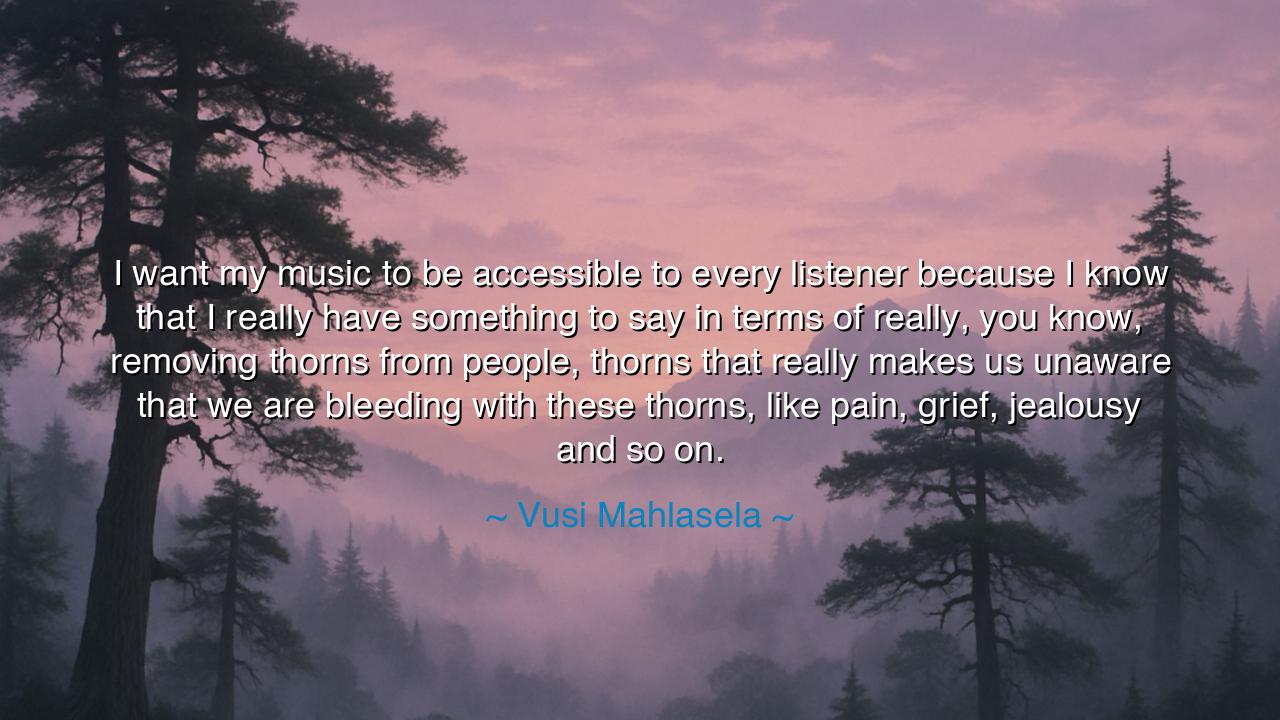
I want my music to be accessible to every listener because I know
I want my music to be accessible to every listener because I know that I really have something to say in terms of really, you know, removing thorns from people, thorns that really makes us unaware that we are bleeding with these thorns, like pain, grief, jealousy and so on.






There are few voices in this world that sing not for glory, but for healing. Vusi Mahlasela, the South African poet and musician often called The Voice, once said: “I want my music to be accessible to every listener because I know that I really have something to say in terms of really, you know, removing thorns from people — thorns that really make us unaware that we are bleeding with these thorns, like pain, grief, jealousy and so on.” His words carry the timeless wisdom of the healer, the sage, and the prophet. He speaks not merely of music, but of the power of art to restore the soul, to reach into unseen wounds and draw out the suffering that festers in silence.
To remove thorns is to perform a sacred act. It means to help others become conscious of their pain, to awaken them from numbness, and to guide them toward wholeness. Many walk through life unaware that they are bleeding — wounded by grief, jealousy, loss, or fear, yet believing this darkness is simply part of who they are. Mahlasela saw in music the divine medicine, a bridge between the human heart and its forgotten light. Like an ancient healer singing over a wound, he used melody to draw out poison — not by force, but by compassion.
His insight was born from the soil of struggle. Vusi Mahlasela grew up in apartheid South Africa, where the human spirit was crushed under hatred and division. He watched his people endure suffering so deep it threatened to erase their dreams. Yet from that darkness rose his voice — not one of anger, but of forgiveness, of awakening. His songs became the balm for a wounded nation, a way to remind the oppressed that even amid blood and sorrow, there remained something holy within them. The thorn he sought to remove was not only political injustice, but the spiritual despair that grows when pain is left unspoken.
In ancient times, such a calling would have made him a bard or prophet. The ancient healers of many cultures believed that music could realign the heart with the rhythm of creation. The psalmists sang to ease sorrow; the shamans chanted to cleanse the soul. Mahlasela walked this same path, reminding the modern world of what it had forgotten — that art is not decoration, but redemption. His music is not an escape from pain, but a mirror through which one sees that pain clearly, and in seeing it, becomes free.
The thorns he names — pain, grief, jealousy — are not random; they are the hidden enemies of the human spirit. Pain dulls our compassion, grief isolates us, and jealousy blinds us to our own blessings. Each thorn, if left untouched, hardens the heart. But when one hears a song that speaks truth, something begins to shift within — the thorn loosens. We remember that we are not alone in our wounds, that others too have bled, and that healing begins not in silence, but in shared expression. This is the miracle Mahlasela offers: the awakening of empathy through art.
In his vision, accessibility is not about fame; it is about unity. He wishes that no listener — rich or poor, young or old, free or bound — should feel excluded from the power of healing sound. His dream is that every heart may hear itself in his music, and through that recognition, rediscover its capacity for love. This is the work of the true artist: not to dazzle, but to lift burdens; not to perform, but to transform.
Let this be the lesson to all who walk the creative path: if your words, your song, or your labor do not heal, then they are hollow. The world is already full of noise, but what it longs for is truth — the kind that soothes, uplifts, and connects. Follow the example of Vusi Mahlasela: let your gift be a mirror that shows others their hidden wounds, not to shame them, but to set them free. For every human being carries thorns unseen, and only through love — through expression, through compassion — can they be removed.
And when those thorns are finally drawn out, when the heart is cleansed of jealousy, grief, and pain, what remains is light — the unbroken song of the soul. That is the true purpose of creation, and the noblest destiny of art: not to entertain, but to heal; not to impress, but to make the human spirit whole again.






AAdministratorAdministrator
Welcome, honored guests. Please leave a comment, we will respond soon